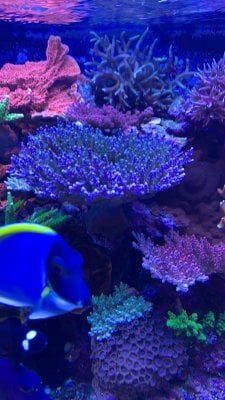- Joined
- May 31, 2017
- Messages
- 1,930
- Reaction score
- 2,140
Feed more, Get more fish. Pick up some reef energy A+B. You need to get phosphates up a little more.I see.. I have 7 fish total — 2 tangs, 2 chromis, clown, dottyback, angelfish. Algae hasn’t been a problem, have a pretty solid CUC assembled and plus the nutrients are obviously on the low end. I’ve been slowly building up my export program, with the goal of eventually running heavy nutes in, heavy out. That’s been the plan anyway.

















